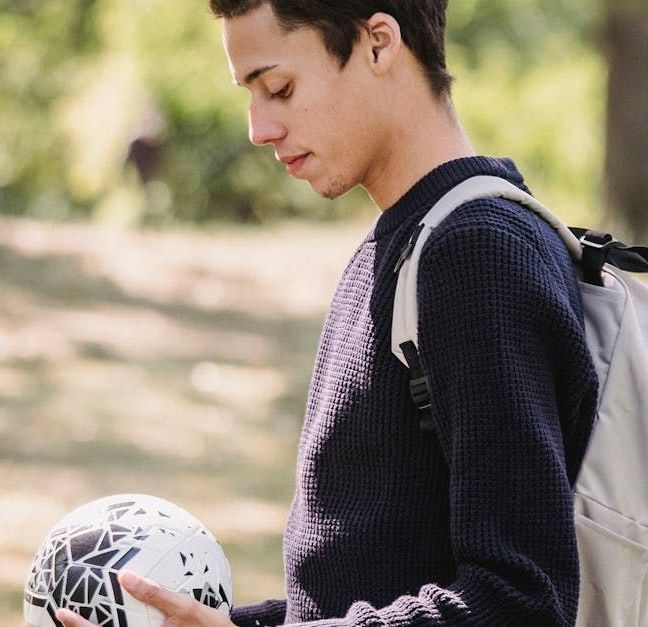How to "Show, Not Tell" Your Teens That You Believe in Them
Roya Dedeaux, MS, LMFT
"actions speak louder than words."
How many times have you heard that expression?
As a parent, expressing belief in your teen's potential and abilities is crucial for their confidence and self-esteem. However, actions often speak louder than words. While telling your teen you believe in them is important, consistently demonstrating this belief through your actions can have a more profound and lasting impact. In this blog post, we’ll explore practical ways to "show, not tell" your teen that you believe in them, fostering a supportive and empowering environment.

A little note from your friendly neighborhood therapist - you have to genuinely believe in them for any of this to work.
Teens are like the best detective private investigators with a highly tuned sense of interpersonal dynamics - they are hyper aware of when something feels disingenuous AND may be extra attuned to criticism. This combo of super powers means you have to be honest.
Step one will explore how you can take a hard look at whether or not you believe in them before you move on to showing them you do.
ZERO - Examine yourself
Before you rush in to say, “of course I believe in my teen!” Stop for a second and imagine them in a variety of situations. If they were driving and got in a fender bender, do you believe that they could handle themselves in that difficult scenario? What about returning clothes and having a difficult customer service interaction? Getting dumped from their first love? Applying for, interviewing, and training for a new job? If you can’t imagine them moving through those challenges, then there’s a good chance that you want to believe in them, rather than genuinely believing in their abilities as they stand right now.
That’s okay. That’s good information.
Don’t ignore that and pretend like you believe in skills you don’t see existing. That’s just information that you need to back up and provide more opportunities for incremental skill building where you can also watch and gather the evidence that your teenager is capable of handling whatever life throws at them.
ONE: Encourage Their Interests and Passions
Supporting your teen’s hobbies and interests is a powerful way to show you believe in them.
Whether they're into sports, music, art, or any other activity, encourage them to pursue their passions. Attend their games, performances, or exhibitions, and show genuine interest in their progress. This not only validates their efforts but also reinforces your belief in their talents and potential.
If you stop reading after this first point, I’d be okay - because as a therapist I genuinely think
this is the single most important key to believing in your teens AND showing them that belief!

“But Roya,” I hear you say, “How can supporting my teenager play more Minecraft be the key to showing them I believe in them?”
Let me break that down for you.
A) When you join them in their interest area, you communicate that you trust how they want to spend their time.
That’s a powerful message! It shows you trust their choices.

B) The things your teens are into are also the places where they are willing to try the hardest, deal with setbacks in a positive way, and gain new skills.
I’m thinking about a client whose parents were so worried about their son’s lack of work ethic at home - but week after week saw him pursuing new soccer moves, training and building his stamina, and becoming a leader on the field.
Once they realized he was building those characteristics through soccer, it was an easy journey for them to stop being so scared about his future success.
C) It also gives you insight about what their current strengths are and areas they might need some extra support.
If you are watching how creative and imaginative your teen is when they make art, but you realize they aren’t the most assertive communicator when they need new supplies -then you have great information about how to help bolster them up in the future.

TWO: Give them responsibilities
One of the best ways to show your teen that you believe in their abilities is by giving them responsibilities - but hold your chore-list-organization-charts for just a second.
I don’t mean making up a bunch of (relatively) arbitrary tasks and then passing them down to unwilling family members.
I mean including your teenager in the real conversation about what it takes to make your community (household or family) run. Get their real buy-in about what needs to be contributed and what sorts of value they see themselves providing.
There are so many ways to contribute meaningfully and responsibly, and getting them invested from the beginning all the way down to handling the tasks and making decisions is a great way to help them develop a sense of independence and accountability.
THREE: Listen Actively and Empathically
Active listening is a key component of demonstrating belief in your teen. Use your nonverbal communication prowess to show them that you are fully, 100% on their team believing their perspective. When they talk about their experiences, thoughts, or concerns, give them your full attention. Avoid interrupting or offering unsolicited advice. Instead, listen empathically and ask thoughtful questions that encourage them to express themselves. This shows that you value their opinions and trust in their decision-making. If they ask for help or ideas, yay! But don’t assume that’s what they want.
FOUR: Celebrate their achievements, big and small
Acknowledging your teen's achievements, regardless of size, is a great way to show you believe in them - but again, there’s a catch.
Your teen needs to feel like the achievement is worthy of being celebrated as well.
However, how many of you have teens that are embarrassed of everything and don’t want any attention?
That means
you need to be creative about how you celebrate their milestones, and match the level of your excitement to the scale of the accomplishment. Don’t throw a parade if they take the trash out of their room, you know?

Celebrate milestones like academic accomplishments, personal growth, or success in extracurricular activities. Praise their effort and dedication, and remind them that their hard work pays off - but these celebrations can be simple, sweet, and sincere. They also don’t need to be public. Maybe you make them a favorite meal, get them a new book in a favorite series, invite them to take them out to ice cream, or send them a text with way too many exclamation marks (!!!!!!!!) Celebrating their achievements reinforces their confidence and motivates them to continue striving for success.
FIVE: Allow them to make mistakes
Believing in your teen also means trusting them to learn from their mistakes. Oh my friends, this is the hard one. We can’t believe only in our teen’s ability to succeed, we also have to believe in their ability to make and recover from mistakes.
I had a ceramics instructor who told us that we should ruin 3/4 of the projects we made in our first semester. She told us that if we didn’t experience a high level of failure, we weren’t being curious enough, we weren’t experimenting enough, and we wouldn’t be learning enough.
Mistakes are inevitable, failure is an important instructor, and we learn so much about ourselves through that process.

Instead of shielding them from failure, allow them to experience and navigate challenges. Offer support and guidance, but resist the urge to intervene immediately. This approach helps them develop resilience and problem-solving skills. By showing that you trust them to handle setbacks, you convey confidence in their ability to grow and improve.

SIX: Set high, but realistic expectations
Setting high, yet realistic, expectations is a tangible way to express your belief in your teen's potential. I don’t mean start each business quarter with a goal that you send in a memo to your teen or anything. I mean, assume that your teen can operate at a certain level.
Here’s a scenario that I see happening a lot as a therapist for teenagers: A teenager is facing a difficult scenario, such as an upcoming medical procedure. A parent, trying to be helpful and compassionate says, “I can make that hard phone call for you!”
But the message that the teen gets is, “I don’t think you are capable of making that call so I have to take over.”
Instead, start with the assumption that your teenager can do the hard thing - and only provide assistance if they try and ask for it. And even then - think of yourself more as a spotter for a gymnast rather than someone who needs to come in and do the whole thing. Add just a light touch of specific support.
SEVEN: Support their independence
As teens grow, they naturally seek more independence. Supporting their desire for autonomy demonstrates your belief in their capabilities.
Allow them to make decisions about their lives, from choosing their extracurricular activities to planning their future. Important: trust it, even if it's not the same decision that you would have made!!!
Trust how they choose to spend their time. Trust who they choose to talk to. Offer guidance when necessary, but encourage them to take the lead. This not only builds their confidence but also shows that you trust their judgment.


EIGHT: Be consistent in your support
Consistency is key in demonstrating belief in your teen. Be there for them during both good times and bad, providing a stable source of support. Whether they're celebrating a success or coping with a disappointment, show up consistently. This reliability reassures them that you believe in their strength and resilience, no matter the circumstances.
NINE: Encourage open communication
Fostering open communication with your teen is another way to show your belief in them. Encourage them to share their thoughts and feelings without fear of judgment. When they come to you with problems or concerns, respond with understanding and empathy. This openness shows that you respect their perspective and believe in their ability to handle complex emotions and situations.
If you struggle with this, or if they are reluctant to communicate with you - check out this blog post on how to encourage open communication with your teen.
TEN: Model confidence and positivity
Your own behavior serves as a powerful model for your teen. Demonstrate confidence and positivity in your daily life, and show how you approach challenges with resilience and a growth mindset.
By modeling these attitudes, you indirectly teach your teen to adopt a similar outlook. Seeing you navigate life with confidence reinforces their belief that they can do the same.
Another cautionary tale - make sure you share the complete story. It’s counterproductive to only show you figuring out solution after solution without expressing the challenge you started with. It’s equally unhelpful to only discuss the hardships without demonstrating how you find solutions.

In an age-appropriate way, you get to model the whole process to your teens in order to show-not-tell them how confidence and faith in their own ability is a muscle they can exercise, not some magical quality some people are born with and others aren’t.
Showing your teen that you believe in them goes beyond words—it's about consistent actions that reflect your trust and confidence in their abilities. By giving them responsibilities, supporting their interests, listening actively, and encouraging independence, you can foster a positive environment that empowers your teen to thrive. Remember, your belief in them is a cornerstone of their self-esteem and future success. By consistently demonstrating this belief, you help them build the confidence to pursue their dreams and navigate life's challenges with resilience.

For practical advice navigating the challenging lift off to adulthood, download my free parenting guide here!
30+ pages of ideas, inspiration, and solution-focused exercises for parents of teenagers.

Roya Dedeaux is a Licensed Marriage and Family Therapist with a focus on using creative tools like art, writing, and recreation as a way to help teens and their families navigate adulthood anxiety.
Roya loves running her private practice, her online art group for teens, and helping teens & their parents through her various workshops and webinars! When she's not doing that, she loves to make messes with her three wild & wonderful kids where they live and play hard in Southern California.
Check out more about Roya, therapist, author, & speaker at
www.launchanxiety.com
Launch AnxietyBlog


